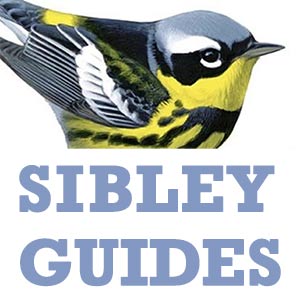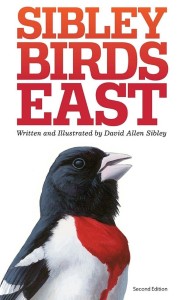See instead: Updates and corrections to the Western Guide
More information about the Eastern Guide
Updates and Corrections
p. xix – lower left, the label reading “lessers coverts” should be changed to “lesser coverts”
page 210 – Ferruginous Pygmy-Owl is missing a weight in ounces, it should be 2.5 oz
page 424-429 – The Checklist is missing some species, and has a few other minor errors (full list below).
A revised Eastern checklist (pdf) can be saved to your computer and printed on standard 8.5 x 11″ paper. Printing on both sides of a sheet of paper, then folding into three panels, and trimming the bottom edge, should result in a list that fits neatly into the back of the book.
Species missing from the list:
Swan Goose, 4
Bar-headed Goose, 4
Black Swan, 4
Helmeted Guineafowl, 37
Red Junglefowl, 37
Golden Pheasant, 37
Indian Peafowl, 37
Lesser Prairie-Chicken, 45
Greater Prairie-Chicken, 45
Great Shearwater, 58
Western Reef-Heron, 75
Sacred Ibis, 84
Yellow-legged Gull, 169
African Collared-Dove, 197
Lewis’s Woodpecker, 228
Chestnut-fronted Macaw, 247
Blue-and-yellow Macaw, 247
Red-lored Parrot, 247
Orange-winged Parrot, 247
Turquoise-fronted Parrot, 247
Mealy Parrot, 247
Eurasian Blue Tit, 297
Great Tit, 297
Hill Myna, 327
Gray-crowned Yellowthroat, 348
Species listed that are not included in the guide:
Rufous-winged Sparrow
Species with incorrect page number:
Lark Sparrow, 385
Species with typo in name:
Sulphur-crested Cockatoo, 242
Family names styled incorrectly:
Family Vireonidae (not “Vireos Vireonidae”)
Family Pycnonotidae
Inside back cover Map – The abbreviation for Arkansas should be AR



Will a revised quick index be posted soon for 2nd edition Eastern Guide?
Hi James, There is a quick index inside the very last page of the guide – a little hard to find but it is there. I don’t have any plans to post a revised version.
I found the index but the quick index in my copy contains errors. For example Grosbeaks in my book is mostly in error and way off where it refers to pages 452-453. Is my copy an anomoly?
Jim G.
Hi James, I had a chance to check this and the quick index is correct for grosbeaks in my copies of both East and West. The page numbers you list are correct for the Western Guide, maybe you have the West index in an Eastern Guide? If that’s the case it’s a mistake in the binding process, with the wrong endpaper pasted into your book. My editor will want to know about that and will provide a correct replacement copy for you. I’ll send you an email. –David
With apologies in advance for a trivial correction to the corrections:
In my Sibley Birds East, 2nd edition, second printing, the Sulphur-crested Cockatoo is on page 242, as already correctly referenced in the printed checklist and index, and in the online replacement pdf checklist. So it seems that the web Updates and Corrections entry for the missing hyphen in the species name in the checklist should read:
“Species with typo in name:
Sulphur-crested Cockatoo, 242”
I have a copy of first edition (2003), seventh printing Sibley Field Guide to Birds of Eastern North America. I love this guide! However when describing habitats and foraging habits of various birds the term “weeds” or weedy” is often used. Is the term being used to collectively describe taller grass & forb habitats that include native prairie plants as well as “old field” vegetation that includes many exotic plants? To most ecologists “weeds” refer to invasive or nonnative (exotic) plants. Perhaps this may have been addressed in more recent editions, but if not, please consider using terminology other than “weeds” and “weedy” in future rewrites.
Dear David,
here are a few additional minor issues with the 2016 edition of the Eastern guide.
1. P. 23 – in the discussion of Common Shelduck, the second sentence says “Occasionally escapes fror….” I assume that “fror” stands fro “from captivity.”
2. P.36 – while describing game birds, the first sentence says “All species are in the family Phasianidae, except Northern Bobwhite and Scaled Quail (Odontophoridae)….” Directly below this first paragraph, THREE (not two) species from the family Odontophoridae are introduced…with Montezuma Quail as an addition to the two mentioned in the first paragraph.
3. P. 316, top of the page – Identification of Spotted “Thushes” (instead of Thrushes).
I hope this is helpful.
The map of North America (back pages) shows an incorrect state abbreviation for Arkansas. The book shows AK, which is Alaska. The correct abbreviation is AR for Arkansas.
Thx
Phil